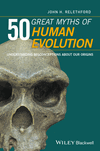RECENT AND FUTURE HUMAN EVOLUTION
Summary
This chapter examines a number of myths and misconceptions about recent evolution of humans, focusing primarily on the last 12,000 years. It also examines a number of myths and misconceptions about human variation, a topic that is best understood in terms of past evolutionary events. The chapter concludes with several myths looking at misconceptions regarding the future of human evolution. Archaeological questions about population origins can be answered in part by evidence from the genetics of living and ancient populations. A key event in human evolution was the Agricultural Revolution. Until recently in human prehistory, human populations all subsisted by hunting and gathering, a lifestyle that limited the size of both local populations and the entire species. As a population undergoes modernization and develops a public health infrastructure, death rates due to infectious disease drop, particularly in the younger age groups. People live longer, which leads to an increase in life expectancy.



